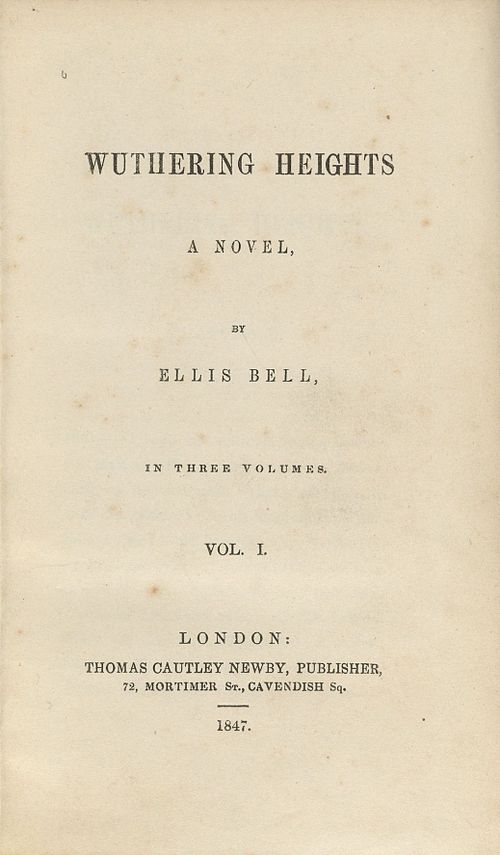
Wuthering Heights
Description
Wuthering Heights is the only novel by the English author Emily Brontë, initially published in 1847 under her pen name "Ellis Bell". It concerns two families of the landed gentry living on the West Yorkshire moors, the Earnshaws and the Lintons, and their turbulent relationships with the Earnshaws' foster son, Heathcliff. The novel, influenced by Romanticism and Gothic fiction, is considered a classic of English literature.
Wuthering Heights was accepted by publisher Thomas Newby along with Anne Brontë's Agnes Grey before the success of their sister Charlotte Brontë's novel Jane Eyre, but they were published later. After Emily's death, Charlotte edited a second edition of Wuthering Heights, which was published in 1850.
Wuthering Heights is now widely considered to be one of the greatest novels ever written in English, but contemporaneous reviews were polarised. It was controversial for its depictions of mental and physical cruelty, including domestic abuse, and for its challenges to Victorian morality, religion, and the class system. It has inspired an array of adaptations across several media, including English singer-songwriter Kate Bush's song of the same name.
In 1801, Mr Lockwood, the new tenant at Thrushcross Grange in Yorkshire, pays a visit to his landlord, Heathcliff, at his remote moorland farmhouse, Wuthering Heights. There he meets a reserved young woman (later identified as Cathy Linton), Joseph, a cantankerous servant, and Hareton, an uneducated young man who speaks like a servant. Everyone is sullen and inhospitable. Snowed in for the night, Lockwood reads the diary of the former inhabitant of his room, Catherine Earnshaw, and has a nightmare in which a ghostly Catherine begs to enter through the window. Awakened by Lockwood's fearful yells, Heathcliff is troubled.
Lockwood later returns to Thrushcross Grange in heavy snow, falls ill from the cold and becomes bedridden. While he recovers, Lockwood's housekeeper Ellen "Nelly" Dean tells him the story of the strange family.
Thirty years earlier, the Earnshaws live at Wuthering Heights with their two children, Hindley and Catherine, and a servant—Nelly herself. Returning from a trip to Liverpool, Earnshaw brings home an orphan whom he names Heathcliff. Heathcliff's origins are unclear but he is described as "like a gipsy" and possibly, a Lascar or an American or Spanish castaway. Earnshaw treats the boy as his favourite. His own children he neglects, especially after his wife dies. Hindley beats Heathcliff, who gradually becomes close friends with Catherine.
Hindley departs for university, returning as the new master of Wuthering Heights on the death of his father three years later. He and his new wife Frances force Heathcliff to live as one of their servants and subject him to much verbal and emotional abuse.
Edgar Linton and his sister Isabella live nearby at Thrushcross Grange. Heathcliff and Catherine spy on them out of curiosity. When Catherine is attacked by their dog, the Lintons take her in, but send Heathcliff home. The Lintons visit, and Hindley and Edgar make fun of Heathcliff; a fight ensues. Heathcliff is then made to live in the manor's unheated, dusty attic and swears that he will one day have his revenge.
Frances dies after giving birth to a son, Hareton. Two years later, Catherine becomes engaged to Edgar. She confesses to Nelly that she loves Heathcliff, and will try to help him, but feels she cannot marry him because of his low social status. Nelly warns her against associating with a man like Heathcliff. Heathcliff overhears part of the conversation and, misunderstanding Catherine's heart, flees the household. Distraught, Catherine falls ill.
Three years after his departure, with Edgar and Catherine now wed and expecting children, Heathcliff unexpectedly returns, now a wealthy gentleman. He encourages Isabella's infatuation with him as a means of revenge on Catherine. Enraged by Heathcliff's constant presence at Thrushcross Grange, Edgar banishes him. Catherine responds by locking herself in her room and refusing food; she never fully recovers. At Wuthering Heights, Heathcliff exploits Hindley's gambling addiction and compels him to mortgage the estate to cover his losses. Heathcliff elopes with Isabella, but the relationship fails and they soon return.
When Heathcliff discovers that Catherine is dying, he visits her in secret. She dies shortly after giving birth to a daughter, Cathy, and Heathcliff rages, calling on her ghost to haunt him for as long as he lives. Isabella, bitter over Heathcliff's devotion to a dead woman, flees south where she gives birth to Heathcliff's son, a sickly boy named Linton. Hindley dies six months later of alcoholism, and Heathcliff then takes possession of Wuthering Heights as its new master.
Twelve years later, after Isabella's death, the still-sickly Linton is brought back to live with his uncle Edgar at the Grange, but Heathcliff insists that his son must instead live with him. Cathy and Linton (respectively at the Grange and Wuthering Heights) gradually develop a relationship. Heathcliff schemes to ensure that they marry in order to ensure his claim to Thrushcross Grange, and on Edgar's death demands that the couple move in with him. He becomes increasingly wild and reveals that on the night Catherine died he dug up her grave, and ever since has been plagued by her ghost. When Linton unexpectedly dies, Cathy has no option but to remain at Wuthering Heights.
Having reached the present day, Nelly's tale concludes.
Lockwood grows tired of the moors and moves away. Eight months later he returns for a visit, and Nelly, now the housekeeper at Wuthering Heights, tells him what has happened since he left.
Heathcliff gave up his opposition to Cathy and Hareton's union. He declined physically and started seeing visions of the dead Catherine; he avoided the young couple, saying that he could not bear to see Catherine's eyes, which they both shared, looking at him. He eventually stopped eating, and some days later was found dead in Catherine's old room.
Cathy has been teaching the still-uneducated Hareton to read. They plan to marry and move to the Grange, accompanied by Nelly, with Joseph being left to take care of Wuthering Heights. Nelly reports that the locals have seen the ghosts of Catherine and Heathcliff wandering abroad together. Lockwood seeks out the graves of Catherine, Edgar, and Heathcliff, and is convinced that all three are finally at peace.
The original text as published by Thomas Cautley Newby in 1847 is available online in two parts. The novel was first published together with Anne Brontë's Agnes Grey in a three-volume format: Wuthering Heights filled the first two volumes and Agnes Grey made up the third.
In 1850 Charlotte Brontë edited the original text for the second edition of Wuthering Heights and also provided it with her foreword. She addressed the faulty punctuation and orthography but also diluted Joseph's thick Yorkshire dialect. Writing to her publisher, W. S. Williams, she said that
Irene Wiltshire, in an essay on dialect and speech, examines some of the changes Charlotte made.
Early reviews of Wuthering Heights were mixed. Most critics recognised the power and imagination of the novel, but were baffled by the storyline, and objected to the savagery and selfishness of the characters. In 1847, when the background of an author was given great importance in literary criticism, many critics were intrigued by the authorship of the Bell novels.
The Atlas review called it a "strange, inartistic story", but commented that every chapter seems to contain a "sort of rugged power."
Graham's Lady Magazine wrote: "How a human being could have attempted such a book as the present without committing suicide before he had finished a dozen chapters, is a mystery. It is a compound of vulgar depravity and unnatural horrors".
The American Whig Review wrote:
Douglas Jerrold's Weekly Newspaper wrote:
The Examiner wrote:
The Literary World wrote:
The English poet and painter Dante Gabriel Rossetti admired the book, writing in 1854 that it was "the first novel I've read for an age, and the best (as regards power and sound style) for two ages, except Sidonia", but, in the same letter, he also referred to it as "a fiend of a book – an incredible monster ... The action is laid in hell, – only it seems places and people have English names there".
Rossetti's friend, the poet Algernon Charles Swinburne was another early admirer of the novel, and in conclusion for an essay on Emily Brontë, published in The Athenaeum in 1883, writes: "As was the author's life, so is her book in all things: troubled and taintless, with little of rest in it, and nothing of reproach. It may be true that not many will ever take it to their hearts; it is certain that those who do like it will like nothing very much better in the whole world of poetry or prose."
Until late in the 19th century "Jane Eyre was regarded as the best of the Brontë sisters' novels". This view began to change in the 1880s with the publication of A. Mary F. Robinson's biography of Emily in 1883.
Modernist novelist Virginia Woolf affirmed the greatness of Wuthering Heights in 1925:
Similarly, Woolf's contemporary John Cowper Powys referred in 1916 to Emily Brontë's "tremendous vision".
In 1926 Charles Percy Sanger's work on the chronology of Wuthering Heights "affirmed Emily's literary craft and meticulous planning of the novel and disproved Charlotte's presentation of her sister as an unconscious artist who 'did not know what she had done'." However, for a later critic, Albert J. Guerard, "it is a splendid, imperfect novel which Brontë loses control over occasionally".
Still, in 1934, Lord David Cecil, writing in Early Victorian Novelists, commented "that Emily Brontë was not properly appreciated; even her admirers saw her as an 'unequal genius'," and in 1948 F. R. Leavis excluded Wuthering Heights from the great tradition of the English novel because it was "a 'kind of sport'—an anomaly with 'some influence of an essentially undetectable kind.'"
Thanks to Wikipedia for this content
 Thanks to Siobhán Murphy
for the idea of this Favorite
April 02, 2025
Thanks to Siobhán Murphy
for the idea of this Favorite
April 02, 2025
 Sofia García
Sofia García
 Daniel Martinez
Daniel Martinez
 Nguyen Van An
Nguyen Van An
 Jane Smith
Jane Smith
 David Lee
David Lee
 Fatima Ahmed
Fatima Ahmed
 Michael Brown
Michael Brown
 Luca Rossi
Luca Rossi
 Nadiya
Nadiya
 Hugo van Dijk
Hugo van Dijk
 Sven
Sven
 Omar Hassan
Omar Hassan
 John Doe
John Doe
 Hiroshi
Hiroshi
 Liam
Liam
 Isabella Fernandez
Isabella Fernandez
 Laura Moore
Laura Moore
 Yarik
Yarik
 Freja Lindström
Freja Lindström
 Jakub Nowak
Jakub Nowak